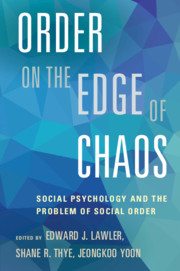Crossref Citations
This Book has been
cited by the following publications. This list is generated based on data provided by Crossref.
2016.
Publications Received.
Contemporary Sociology: A Journal of Reviews,
Vol. 45,
Issue. 3,
p.
372.
Chin, Lynn Gencianeo
2017.
Comparative Analysis in Group Processes: Expanding the Reach of Sociological Social Psychology.
International Journal of Sociology,
Vol. 47,
Issue. 4,
p.
251.
2017.
Gesamtverzeichnis 2017 der besprochenen Bücher.
Soziologische Revue,
Vol. 40,
Issue. 4,
p.
639.
Hardy, Catherine
and
Levine, Linda
2018.
The Control Paradox.
EDPACS,
Vol. 58,
Issue. 1,
p.
1.
Thye, Shane
Lawler, Edward J.
and
Yoon, Jeongkoo
2019.
The Formation of Group Ties in Open Interaction Groups.
Social Psychology Quarterly,
Vol. 82,
Issue. 2,
p.
158.
Andreouli, Eleni
Kaposi, David
and
Stenner, Paul
2019.
Brexit and emergent politics: In search of a social psychology.
Journal of Community & Applied Social Psychology,
Vol. 29,
Issue. 1,
p.
6.
Rogers, Kimberly B.
2020.
The problem of order: Understanding how culture predicts social action.
Sociology Compass,
Vol. 14,
Issue. 7,
Small, Mario L.
Perry, Brea L.
Pescosolido, Bernice
and
Smith, Edward B.
2021.
Personal Networks.
Perry, Brea L.
2021.
Personal Networks.
p.
612.
MacKinnon, Neil J.
and
Hoey, Jesse
2021.
Operationalizing the Relation Between Affect and Cognition With the Somatic Transform.
Emotion Review,
Vol. 13,
Issue. 3,
p.
245.
Harrell, Ashley
and
Quinn, Joseph M
2023.
Shared Identities and the Structure of Exchange Distinctly Shape Cooperation.
Social Forces,
Vol. 102,
Issue. 1,
p.
223.
Shen, Bo-Wen
Pielke, Roger A.
and
Zeng, Xubin
2023.
The 50th Anniversary of the Metaphorical Butterfly Effect since Lorenz (1972): Multistability, Multiscale Predictability, and Sensitivity in Numerical Models.
Atmosphere,
Vol. 14,
Issue. 8,
p.
1279.





